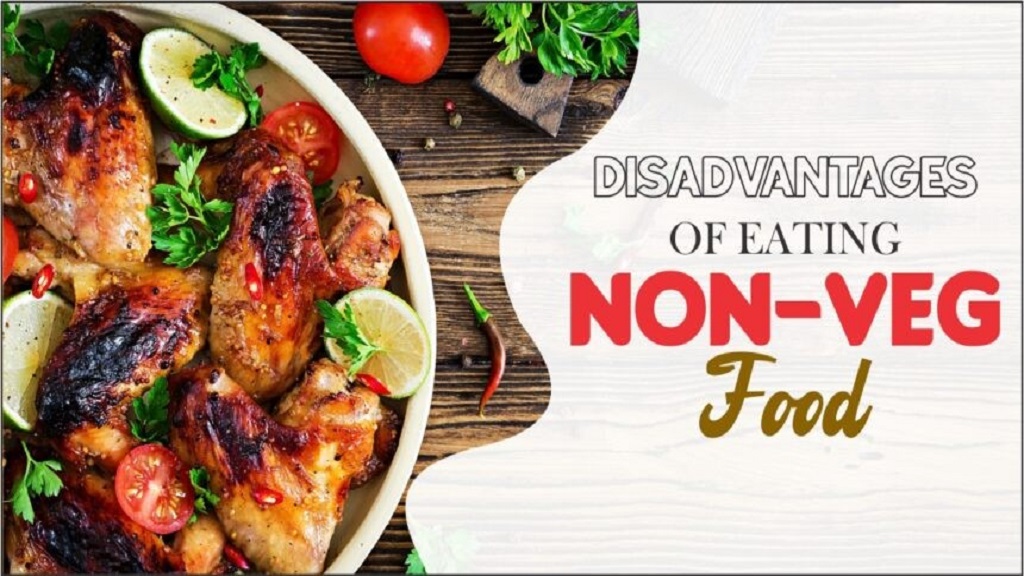1. Introduction
In actuality, a Disadvantage of eating non veg food diet is simply not what people eat. God did not design food that is not vegetarian for humans. It is unclear to modern dieticians which diet — vegetarian or non-vegetarian — is better. Their understanding of the topic is limited to what they know about proteins, calories, and vitamins. You can’t even classify alcohol as food. This article goes into detail on the detrimental impacts of eating non-vegetarian food and the anguish brought on by bad energy via its medium. Here we would like to emphasize that, unlike spiritual science, modern science does not give the sattvikta (Sattva-predominance; purity) in food the proper consideration.
2. Why people are eating non-veg?
1. Some people love to eat non-veg
2. Some people eat non-veg to build their muscles
3. Eating non-veg to fulfill their satisfaction and desires,
4. health, cultural traditions, religious beliefs, and scientific arguments that support the practice.
5. An increase in the Tama component facilitates negative energy in causing distress to an individual.
3. What did humans eat 50000 years ago?
Our ancestors had adapted to an omnivorous diet of cooked starches, meats (including organs), nuts, fruit, and other plant foods by the time modern humans developed, about 50,000 years ago.
4. Harmful effects of non-veg diet
A diet devoid of vegetables is unnatural. It provides barriers to the ability to digest.
A non-vegetarian diet obstructs breathing and circulation. People who are not vegetarians run the risk of developing heart problems, stomach and chest cancer, and other illnesses.
A non-vegetarian diet has a high protein content. They are the source of illnesses.
Diets that are not vegetarians have a higher Tama component. Consequently, a person develops tamarisk (Tama-predominant) or demoniacal traits. The diet of devils is not vegetarian.
A non-vegetarian diet distances a person from God.
Ordinary non-vegetarians do not pursue spiritual practices, and even if they do, they are unable to stick with them.
A non-vegetarian diet exacerbates sexual drive issues.
Negative energies can more readily infiltrate the body and establish their centers when eating a non-vegetarian diet.
Note
Take caution! Nature will rob you of calm if you disturb the tranquility of the animals that inhabit the air, sea, and bottom of the earth! Are you not saying you want proteins? There are several proteins in milk, butter, buttermilk, cream, and ghee (clarified butter). Cereals are loaded with nutrients. Why therefore murder animals? “Animals eat the flesh of those who eat the flesh of animals,” says Sage Manu. Take caution! Nature will rob you of calm if you damage the tranquility of the sea, the air, and the bottom of the ground. — Gurudev Dr. Kateswamiji.
5. Why give up non-vegetarian diet?
· Hindus have been pure vegetarians since time immemorial.
· Hindu ideology believes that non-veg food is demoniacal and is the height of cruelty.
· A Hindu woman says, “My husband may eat non-veg food due to the influence of the Western culture; but as his Hindu wife, I will never even touch meat. I will never cook meat at home”
· Hindus living along the coast eat fish, but they do not eat animal meat. They are very strict about this. However, Hindus living in urban areas eat meat due to the influence of Western culture.
· Consuming meat is a Tama-predominant act; therefore, it is prohibited by Hindu Dharma. Consuming such a Tama-dominant diet displays Raja-Tama characteristics of the Western culture.
6. The side effects of consuming non-vegetarian food
· Increased risk of heart disease, stroke, and certain cancers due to the high levels of saturated fats and cholesterol in red and processed meats.
· Environmental impact, including higher water usage, land degradation, and greenhouse gas emissions associated with livestock farming.
· Ethical concerns related to animal welfare and the treatment of animals in the meat industry.
These factors highlight some of the reasons why some people choose to avoid non-vegetarian food and opt for a vegetarian diet instead.
Conclusion
In conclusion, while the decision to consume non-vegetarian food is a personal choice, it is important to consider the potential disadvantages associated with this dietary choice. These include health risks such as heart disease and cancer due to the high saturated fat and cholesterol content in meats, environmental concerns related to resource-intensive livestock farming, and ethical considerations regarding animal welfare. Being mindful of these factors can help individuals make informed choices about their diet that align with their health, environmental, and ethical values.






Comments